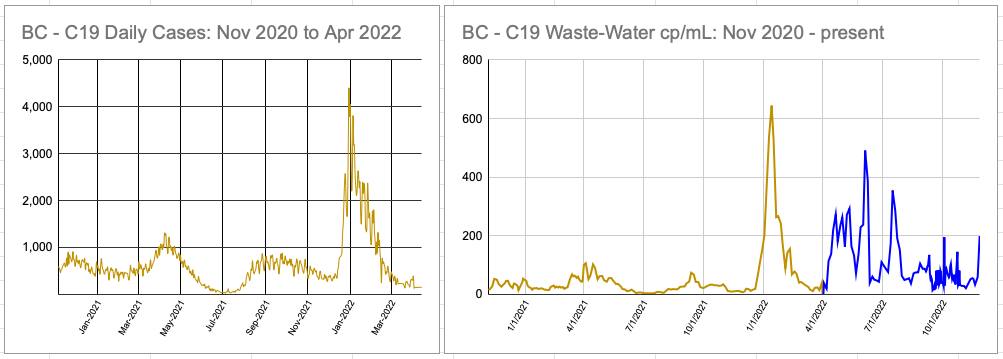December 7, 2022
Hey! It’s been a while… time to post something! Today is the 7th… and it’s been 77 days since the last time I reminded everyone we’re still in the midst of a pandemic (Really? Are we? Maybe?)… and the Canucks scored 7 goals a couple of nights ago to win a hockey game where they were down 4-0 after the first period. Lucky 7s all around!
But let’s talk about another number… a nice big fat round number like… 1,000… because 1,000 days ago was March 12th, 2020… not a particularly significant date, except it was the first time I, personally, said to myself… OK, what the hell is actually going on here…
For context, a few days earlier — March 7th — was the day that the first two cases of C19 (in the Lynn Valley Care Centre in North Vancouver) were announced… Canada’s first case of community transmission. A couple of days later, Canada’s first death; one of those two people.
A thousand days later and here we are… and where exactly are we?
First of all, seriously… 1,000 days? In some ways it feels like 1,000 years ago. In other ways, it feels like last week. The vacuum of the last three years has been messing with a lot of minds, mine included.
Just for fun, I’ve included the same chart, now updated, as last time I posted 77 days ago… a sort of correlation of cases counts associated with levels of C19 found in waste-water. Not the most scientific thing in the world, but it gives you some idea that this virus is still out there, especially with that last spike. Cause for concern? It coincidentally equates to implying around 1,000 new cases per day. Make of that what you will.
So… let’s briefly talk about the virus. But no, not Covid. Not a cold virus or flu virus either. Let’s talk about… Monkeypox.
Oh yeah! Remember that? Yeah, yeah… what happened to that, anyway?
Exactly. The short answer is, not much. Not much at all. But… since we were all in full “pandemic alert” mode, it potentially turned into a lot more than that, certainly as far as the media was concerned. That is, until the science caught up. If you’re wondering how it all panned out here in Canada: 1,459 cases, 44 hospitalizations, 0 deaths. Yes, zero deaths. Let’s move on.
But let’s talk about that scientific aspect of it, because that’s been very relevant during Covid, especially this issue of science “catching up.” Every time there’s been a change in policy, a new way of looking at it, a new strategy of dealing with it, half the people scream, “You see?! tHeY dOn’T kNoW wHaT tHeY’rE TaLkInG aBouT!!1!!1!!!!” The other half understand how the scientific method works, and that shifting opinions often have to do with the science finally catching up.
Allow me to talk about both of my grandmothers (of blessed memory) for a moment. They left this world many years ago, but they also left behind a lot of wisdom, and I will impart upon you two pieces of unscientific wisdom that they (and every other grandmother, Jewish or not), would tell you: One, if you’re feeling sick, chicken soup will heal you and/or at least make you feel better. And two, wear a jacket or wear a sweater… don’t just go out in the cold or you’ll get sick.
Hardly earth-shattering wisdom, scientific or not. We’ve all heard it a thousand times, whether we agree we it or not.
The chicken soup thing has been around for thousands of years… and it makes sense. Millenia ago, infant mortality was 100x higher than today. You had a 50/50 chance of making it past childhood, so you can imagine, just like today but even more fiercely back then: When a kid got sick, grandma did everything she could to keep the kid alive. Let’s try this, let’s try that. Someone decided to try chicken soup, and it seems to have made a difference. Then someone down the road tried adding more to it – this vegetable, that vegetable, whatever. There’s nothing scientific here… because that’d require giving chicken soup to one kid, not to another, and then watching the latter kid die and then wonder if it might have made a difference. All things being equal, everyone gets chicken soup and everyone, generally, gets better. Science be damned, we don’t need fancy statistics to tell us it works.
Indeed, that was the case for thousands of years. Nobody knew why, just that it worked. More recently, our understanding of how the body works led to a number of observations… like: Chicken has tryptophan, which helps your body produce serotonin… a great mood-enhancer. The noodles are a simple carb – a good source of energy. The carrots and celery and onion have vitamins C and K and other anti-oxidants, all of which promote a healthy immune system. And finally, especially like my grandmothers liked it, it’s piping-hot… and steam on its own makes it easier to breathe, opening up the airways with its mild anti-inflammatory effect.
Now… scientifically speaking, does that paragraph actually prove anything? Not really. It’s full of possibilities and maybes, but there’s still no scientific method to it. But hang on, we’re not done here…
Twenty-two years ago, an actual scientist decided to get to the bottom of this and did a proper study. The results are detailed and quite specific, and here’s a summary:
“A variety of soup preparations was evaluated and found to be variably, but generally, able to inhibit neutrophil chemotaxis. The current study, therefore, presents evidence that chicken soup might have an anti-inflammatory activity, namely the inhibition of neutrophil migration.”
I’ll admit I don’t understand all of that, but I certainly get the gist of it. The paper goes into it far more, and is easily Googleable if you’re interested in the details… but the summary is, yes – it works.
Let’s call that Exhibit A of where the science finally caught up with it.
Exhibit B is the other bit of wisdom, one that’s led to plenty of discussion in the past, and especially in the last 1,000 days.
If you’re all alone in the middle of nowhere and step out into the cold, can you catch a cold? Probably not, though it’s not impossible that you have some cold viruses attached to you and they happen to make you sick. But the cold on its own – no. Therefore, the conclusion is that “cold” can’t give you a cold and that, therefore, notwithstanding everyone gets colds when it’s cold out, there must be another explanation, most of which centre around the idea of people clustering together out of the cold, viruses last longer in drier air, less sunlight, less physical activity, etc. It has nothing to do with the cold… it’s just a by-product of our communal behaviour during the season when everyone is inside, in close proximity and breathing all over each other.
It’s always been my opinion that the cold seems to compromise your immune system… so that viruses that are actually around us all the time seem to be able to get a better grip when it’s cold. I have no scientific basis for claiming that; just life experience. And the persistent brainwashing from my grandmothers, parents and every single other person who, at some point, was tasked with making sure I’m OK. Bundle up, wear a jacket, don’t go out into the cold like that because you’ll get sick. Blah blah blah. But life experience has shown this to be true, even if science hasn’t. At this very moment, the John Hopkins site says this:
“Contrary to popular belief, cold weather or being chilled doesn’t cause a cold. However, more colds do occur during the cold season (early fall to late winter). This is probably due to a variety of factors, including: Schools are in session, increasing the risk for exposure to the virus.”
Well, guess what. A study published yesterday proves that – yes, that’s right, the cold does indeed compromise the immune system, at least specifically when it comes to respiratory illness. The front of the nose has small fluid-filled sacs as part of the initial immune response, and the fluid secreted from there attacks bacteria and viruses as best it can. And what happens when the temperature of the nose drops, say from room temperature to less than 5°C? Does it affect that particular immune response? Yes. Drastically. To the extent that all the viruses hanging around trying to find a way in suddenly themselves with a far easier point of entry.
Exhibit B – the science finally caught up with something we’ve all know. Let’s see how long it takes John Hopkins, a well-respected source of scientific knowledge, to change their opinion. And no, it’s not because they were wrong; it’s because we’ve all learned something, and now we’re all better off for it. This will undoubtedly lead to prevention methods and other benefits.
When it comes to Covid, we’ve learned so much over the last 1,000 days that in some way, it’s possibly the preferred disease to catch. If you have Covid and need treatment, there are fully-stocked artilleries of options. Unlike this insanely contagious and relatively serious flu that’s going around this year, affecting everyone – especially kids. It’s horrifying to think it’s killed 6 children in BC in the last two weeks. What the hell – how can that be happening in 2022? What can anyone do about it?
At the risk of repeating myself for the 1,000th time, the science has caught up with this as well. There’s a vaccine, and it targets this Influenza type-A subtype H3N2 virus. It should prevent you from getting sick, or at least, seriously sick. I mean, don’t get me wrong… chicken soup is great… but it’s probably better to not get sick in the first place. Let’s all stay healthy.
And… on that note, whatever it may be that you’re celebrating, be it Christmas or Hanukkah or Kwanzaa or Ōmisoka or Festivus – or nothing – whatever it is, wishing you all a Happy and Healthy Holiday Season!
… and when you go outside, be sure you wear a sweater. And maybe a good jacket – no, not that one, the heavier one. Hey, a scarf wouldn’t hurt either.


